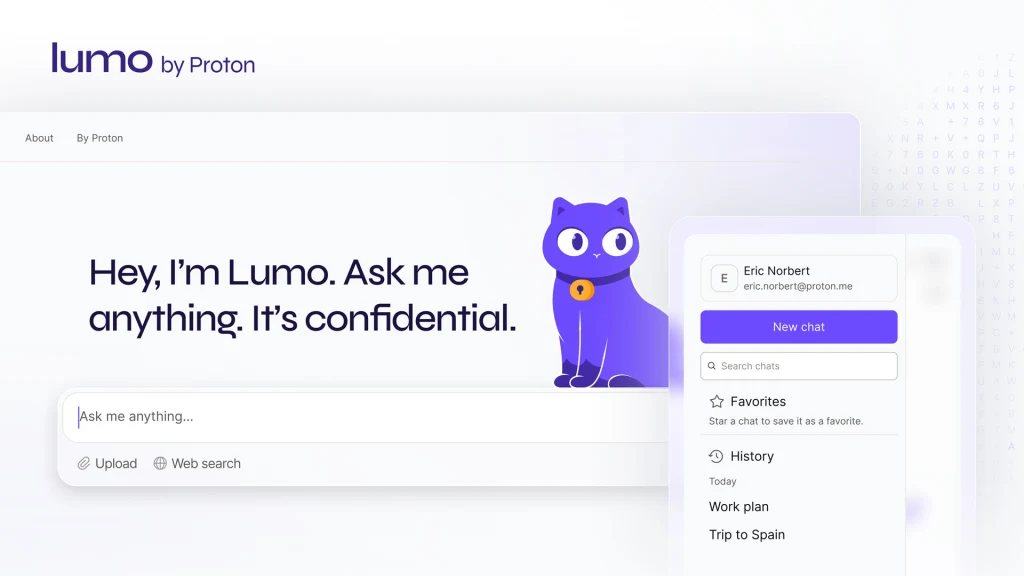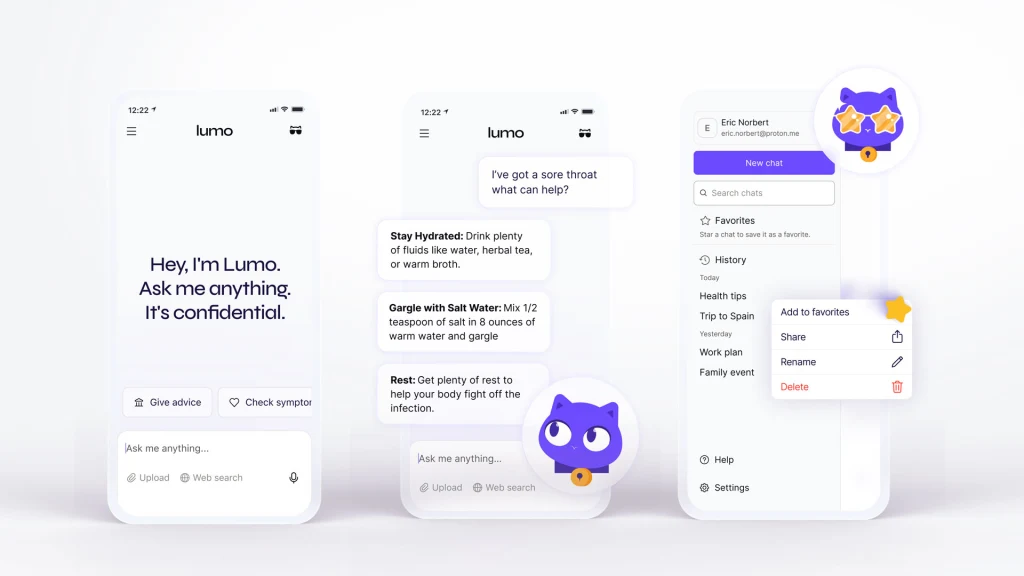Proton is getting into generative AI with an assistant called Lumo, which it pitches as a more private alternative to ChatGPT.
While Lumo will offer a similar chat-based interface with support for web search and file analysis, Proton says it won’t store records of users’ conversations or use them to train AI. Lumo is available for free on the web and mobile devices, with an optional $13-per-month or $120-per-year subscription for unlimited chats, extended chat history, and larger file uploads.
Andy Yen, Proton’s founder and CEO, says Lumo is a way for people to utilize AI assistants without having to worry about how their conversations could be used.
“I think it’s critically important, given the amount of sensitive information that we are dumping into AI, that there be a private alternative,” Yen says.
Why you might want Proton’s private AI
It’s already possible to maintain some privacy while using major AI tools. ChatGPT, for instance, offers a setting to opt out of training OpenAI’s models. It also provides a “Temporary Chat” feature for conversations that don’t appear in your chat history or affect what ChatGPT remembers about you. Google’s Gemini also lets users opt out of model training through a Gemini Apps Activity setting.
But those settings are not the default, and neglecting them effectively sends your data into a black box. Once your data’s been fed to a model for training, it can be extremely difficult to remove, and some providers, including Google, will even show a subset of conversations to human reviewers without disclosing when that happens. ChatGPT also warns that its “Temporary Chat” mode still stores conversations for up to 30 days for safety reasons.

“Before we created Lumo, I’d use ChatGPT sometimes,” Yen says. “But then I’d feel really dirty after using it, because who the hell knows what Sam [Altman, OpenAI’s CEO] is going to do with all my data?”
Proton isn’t the first company to offer a more private alternative. The privacy-centric search engine DuckDuckGo launched its own AI tool, Duck.ai, last year, with a similar promise not to keep a record of users’ conversations or use them for AI training. The difference is that DuckDuckGo has arrangements with major AI providers such as OpenAI and Anthropic, and it sends queries to their servers through a proxy that removes personal information. Those AI providers have promised not to use Duck.ai conversations for training purposes.

Proton isn’t involving major AI providers at all. Instead, Proton’s Lumo AI uses a mix of open-source models that the company runs on its own servers. While conversations aren’t end-to-end encrypted, Proton says it doesn’t keep logs of users’ chats, and conversations are decrypted only on users’ devices.
“We’re giving people a very clear guarantee of privacy in that your chat history is never going to be saved, logged, or even accessible to us, because it’s encrypted in a way that we cannot actually decrypt it,” Yen says.
And why you might not
Proton’s privacy-centric approach has trade-offs, both with its other products and with Lumo.
With Proton Mail, the company can’t offer server-based email search because it has no way of accessing users’ email contents. Instead, Proton builds a local search index on each device where the Mail app is stored. I recently moved away from Proton Mail in large part because the search function was too unreliable.
In the case of Proton’s Lumo AI, its capabilities are already more limited than other assistants. It can’t connect to other apps and services—though Yen says integrations with Proton’s email service and document editor are possible—and it can’t tailor its responses based on past conversations, akin to ChatGPT’s “Memory” feature. Its mobile app offers voice input, but not a free-flowing voice conversation mode. Proton also hasn’t disclosed which open-source models it’s using, and they may not be on par with state-of-the-art models from companies like OpenAI and Anthropic.

Yen says he hasn’t noticed any issues in his own use of Lumo, but acknowledges that some trade-offs are likely.
“If you want to do things in a privacy-first way, there are going to be sometimes compromises that have to be made,” he says. “It’s a new way of doing AI, new ground that we have to break.”
What it means for Proton
For Proton as an organization, a foray into generative AI could also make some users uneasy.
Proton has always prided itself on running a sustainable business that doesn’t rely on venture capital or public shareholders, and it now operates as a nonprofit. Generative AI, meanwhile, is famously a money pit, and like other AI providers, Proton will be offering Lumo access for free.
More broadly, AI competes on some level with human creativity and employment, and it uses vast amounts of energy. Proton has already faced a backlash from some of its users after adding AI writing tools to its document editor, then invoked a similar backlash days later with a foray into cryptocurrency wallets.

Yen’s feeling is that AI represents the future of the web and isn’t going away, so Proton should offer a private alternative. While Proton will likely lose money at the outset, that was also the case when it entered the VPN and email businesses. Yen believes the organization can operate AI efficiently and can always adjust what it offers for free if the losses pile up.
“We believe strongly that this is the right thing to do for the world at this moment, and we’re going to pursue it even if it ends up costing us money,” Yen says. “But of course we’re not going to compromise Proton overall financially.”
Ak chcete pridať komentár, prihláste sa
Ostatné príspevky v tejto skupine

It’s been said that online dating killed the meet cute. Now, as people struggle with dating app burnout, some are supposedly resorting to stealing men’s lunches for a chance at creating their own.
An artificial intelligence agenda that started coalescing on the podcasts of

Tesla is likely to post its

A Trenta Starbucks is no longer cutting it. The latest coffee trend has people ordering their iced lattes by the bucket.
Earlier this year, independent coffee shops started going viral


What happens when you spend decades seeding salacious stories about evil lurking in the halls of power, demanding evidence to prove basic truths, and questioning the veracity of that evidence once

America’s demand for new infrastructure is surging, driven by the AI d
